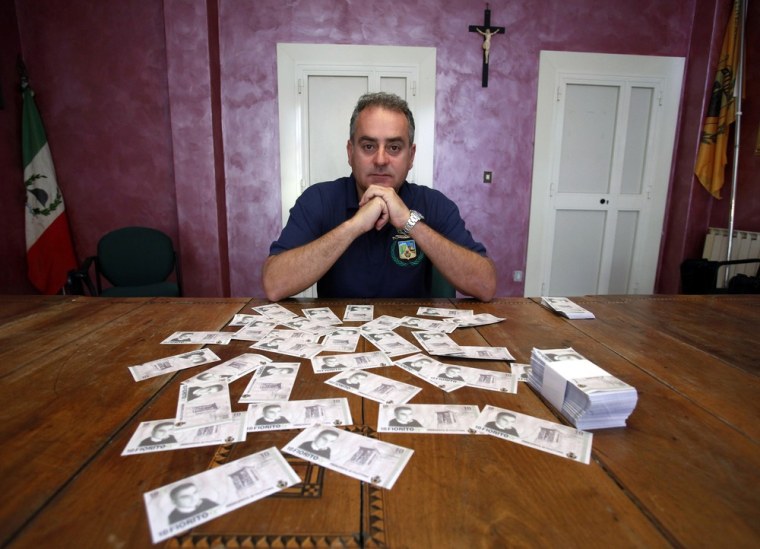When the Italian government announced in mid-August that it would force towns with fewer than 1,000 residents to merge with their neighbors as part of an emergency cost-cutting budget, there were strident protests across the country.
Evoking the history of Italy, a nation forged from countless city-states protective of their local traditions, dialects and diversity, some of the mayors of the 1,963 towns affected by the measure turned in the keys to their cities.
Others said they would welcome immigrants escaping war-torn Libya to push their populations over the 1,000-person threshold.
The mayor of Filettino has loftier aspirations: he wants his town in the hills east of Rome — population 598 — to become an independent state under a monarch.
“If that’s what it takes to keep the town autonomous and protect its natural resources,” said the mayor, Luca Sellari, who was elected in May. Besides, he added, “it’s everyone’s dream to be a prince.”
As befits a monarch, Mr. Sellari has lost little time in pursuing his dream.
'Going like hotcakes'
The would-be principality already has a coat of arms that now graces everything from T-shirts (“going like hotcakes,” Mr. Sellari said) to a liqueur, the Amaro of the Principality, which a local bartender, Maria Cerrocchi, said was just a brand-name bottle “with a photocopied label stuck on it.”
Filettino has even printed its own currency, the fiorito, which means “flowered” (“like the town will flower in its new guise,” the mayor explained) and which harks back to the florin, the money first coined in 13th-century Florence. If fioritos become legal tender (so far they are just souvenirs), the exchange rate is supposed to be set at two to the euro, or about 72 cents apiece.
“See, we’ve resolved the public debt issue,” said Enio Marfoli, who is Filettino’s part-time councilor for culture and a full-time oboist who plans to write the national anthem. Mr. Marfoli said he was already doing his part to help the Italian state trim administrative expenses: as councilor, he works for free. “It’s basically volunteer work,” he said.
Across Italy, small-town mayors are angry that the national government chose to cut their relatively negligible budgets rather than tackle big, politically sensitive issues like raising the country’s retirement age.
Waiting for a 'revolution'?
“Do you know how much all the mayors and town councilors in small Italian towns cost the state?” asked Franca Biglia, president of the National Association of Small Towns, known as Anpci. The answer: 5.8 million euros, she said, about the same as the lower house of Parliament “pays for its restaurant services.”
She added, “We work like crazy, and they want to cut something that costs the same as their kitchen. What are they waiting for? A revolution to explode?”
The government, it seems, may be harboring similar thoughts. After Anpci mayors loudly protested in front of the lower house on Friday, they were assured that their concerns would be taken into account when the Senate voted on the crisis measures beginning this week.
There are also signs that the government is softening on other fronts, like the proposed cuts to research institutes with fewer than 70 employees or to provinces with fewer than 300,000 residents.
News media reports suggest that those two measures may be stricken from the emergency budget that was hastily adopted on Aug. 12 in an effort to calm the financial markets and to satisfy the European Central Bank, which was pressing Italy to speed up work on balancing its budget.
Since then, a number of proposed budget amendments — many of them offered by the ruling majority — have piled up for the Senate to address. That is a sign of serious political difficulties for Prime Minister Silvio Berlusconi, whose increasingly fractious majority in Parliament is striving to make the austerity measures more palatable to voters.
“Berlusconi wants to continue governing, but he can’t, that’s the problem,” said the opposition leader Pier Luigi Bersani of the Democratic Party. He noted that just a few days after the cabinet had unanimously approved the crisis measures, “ministers each wanted to change the recipe.”
“This is the political problem that we have in Italy,” Mr. Bersani said, one that undermines the government’s credibility.
'High uncertainty'
Tito Boeri, an economics professor at Bocconi University in Milan, said that “the situation is one of high uncertainty, and we don’t really know where it’s going to go at the end of the day.”
He said strong opposition to some of the spending cuts was putting pressure on Parliament to raise revenues.
One possibility was an increase in the value-added tax on sales. “But a tax-based intervention is going to be less effective to foster growth” in Italy, which has one of the slowest-growing economies in the European Union, Mr. Boeri said.
Italian business leaders have also voiced concerns.
“The crisis isn’t over, and this calls for forceful, even unpopular, decisions,” Emma Marcegaglia, the president of an Italian industrial association, told reporters on Saturday. The political bartering , she said, was “only making things worse.”
The Senate is scheduled to start voting on the austerity budget package on Tuesday, and amendments are likely to change its focus and impact.
But even if the measure to force the small-town mergers is withdrawn, Mr. Sellari, the would-be prince of Filettino, said he would go ahead with his monarchial plans.
He was scheduled to meet Monday with one of Italy’s most famous lawyers to examine the legalities involved in secession — constitutional details that he said he was certain could be overcome.
“It’s part of the principality’s motto,” he said. “‘Nec flector, nec frangor’ — we won’t bow or break when it comes to our plans.”
This article, headlined "In an Italian Town, Dreams of Independence on a Princely Scale," first appeared in The New York Times.
